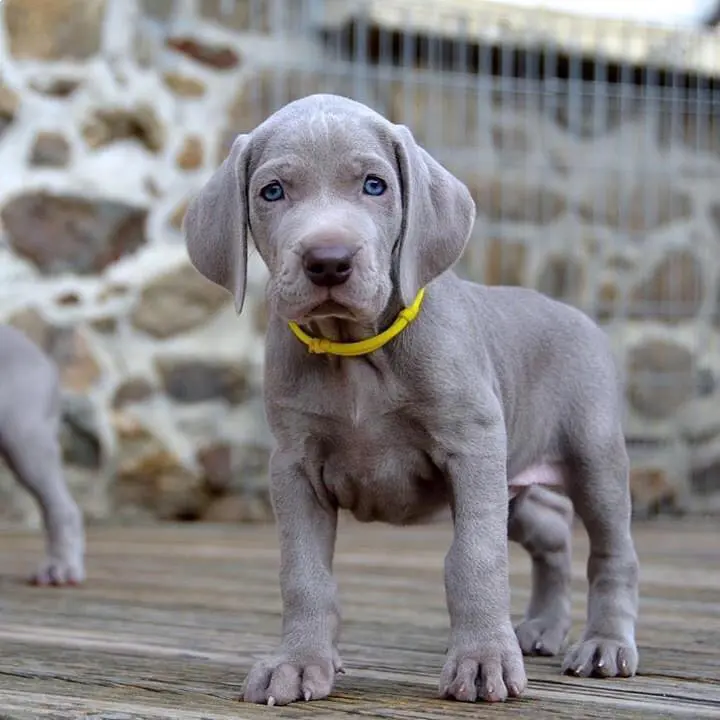Weimaraner Dog Profile Information And Facts

The Weimaraner breed is a stunningly handsome and energetic dog breed with a heart of gold. Often nicknamed the "Gray Ghost" for their sleek silver coat, Weimaraners are more than just beautiful faces. They're intelligent, loyal companions who thrive on adventure and affection.
So, keep reading this blog to the end to learn about facts and information about the Weimaraner and discover if this energetic breed might be the perfect furry friend for your family.
Weimaraner Breed Overview
Often referred to as grey ghost dogs, this eye-catching large breed was originally bred to be a hunter's best friend. Over the years, Weimaraners have become popular with families because they're friendly, intelligent, and very loyal. Their most striking features are probably their amber or blue-grey eyes, complementing their solid grey or silver coat. Some Weimaraners might have a white marking on their chest.
Weimaraners are a mix of different dog breeds, possibly including Bloodhounds and some German and French hunting dogs. They have a lot of energy, so exercise is necessary to keep them happy and well-behaved.
But don't let their athleticism fool you because these pups are also incredibly sweet and love spending time with their humans.
| Kennel Club breed group | gundog |
| Size | large |
| Height | 23 – 27 inches |
| Weight | 55-90 pounds |
| Daily exercise | more than two hours a day |
| Coat | typically short, shedding. There is a long-haired variety, but it is much less common |
| Colors | essentially grey, with varieties of mouse, roe and silver grey. Blue or black coats are undesirable. Light-coloured eyes in shades of amber or blue-grey |
| Lifespan | more than 10 years |
| Bark | a deep, booming bark, not yappy |
| Distinctive features | the sleek, silver coat, for which it is nicknamed the “Grey Ghost”. Gives an impression of power, balance and stamina in an athletic and statuesque frame |
| Temperament | fearless, protective, obedient Intelligent, devoted, friendly, energetic, great with kids and alert |
| Suitable for | families who regularly enjoy outdoor activities and are looking for large, friendly companions |
Weimaraner Characteristics
Weimaraner dog breed are truly stunning dogs, instantly recognizable by their captivating presence which extends beyond their looks, however. Weimaraners are also known for their friendly and loyal personalities as they form strong bonds with their families and thrive on spending quality time with their humans.
Intelligence is another hallmark of the Weimaraner breed. Their eagerness to please and sharp minds make them relatively easy to train, especially with positive reinforcement methods. However, this intelligence is often coupled with a high level of energy.
Bred for hunting, Weimaraners are canine athletes with boundless energy. They crave attention and enjoy nothing more than cuddling up with their loved ones.

Weimaraner Puppies
Puppies of Weimaraner the dog are undeniably adorable, with their soft, wrinkled faces and playful personalities. Their coats are a lighter shade of grey compared to adults, and their eyes are a beautiful blue that will eventually change to amber or grey.
Just like any puppy, Weimaraner puppies require a lot of love, attention, and training. They are intelligent and eager to please but also have a lot of energy and can be mischievous if not properly exercised and stimulated.
Here are some things to keep in mind if you're considering getting a Weimaraner puppy:
• Be prepared to provide plenty of exercise: Weimaraner puppies need regular walks, playtime, and mental stimulation to stay happy and healthy.
• Start training early: These puppies are intelligent and can learn basic commands quickly. However, they can also be stubborn, so it's important to start training early and use positive reinforcement methods.
• Socialize your puppy: From a young age, expose your Weimaraner puppy to new people, places, and experiences. This will help them become well-adjusted and confident dogs.
• Be patient: Like all puppies, Weimaraner puppies will go through a chewing phase and may have accidents in the house. So, be patient and consistent with your training, and your puppy will eventually grow into a well-behaved adult dog.
History
Weim dog breed boasts a rich history intertwined with German nobility and a passion for hunting. Their journey began in the 19th century, in the region around Weimar, Germany, hence the breed's name.
These elegant pets were originally developed by the German aristocracy, specifically Karl August of Weimar, for hunting big game like boar, bear, and even deer.
Early Weimaraners were prized for their exceptional tracking ability, speed, courage, and durability. Selective breeding programs honed these specific traits, with the distinctive silver coat emerging, most likely by accident, as a hallmark of the breed.
For much of their early years, Weimaraners remained under the watchful eye of the German nobility. The dogs were not readily available to the public, and their numbers were kept relatively low to maintain the breeding standards. This exclusivity shrouded the Weimaraner in an air of mystery, contributing to its reputation as a prized possession.

The breed's story, however, took a turn in the late 19th century when they were recognized as a distinct breed in 1891. This opened the door for wider ownership, although it wasn't until the 20th century that Weimaraners truly began to gain international popularity.
At the time, an American named Howard Knight played a pivotal role in bringing the Weimaraner across the Atlantic. He imported a pair of Weimaraners and founded the Weimaraner Club of America in the 1920s, paving the way for the breed's establishment in the United States.
Then, the mid-20th century saw a surge in Weimaraner's popularity, fueled by their success in field trials and their undeniable elegance. Meanwhile, the dogs transitioned from being solely hunting companions to becoming cherished family dogs as well.
Today, Weimaraners are a beloved breed around the world, admired for their loyalty, intelligence, and athleticism. Their journey from aristocratic hunting dog to cherished family member proves their versatility and enduring appeal.
Temperament & Intelligence of the Weimaraner
The dog breed Weimaraner is a captivating blend of loyalty, intelligence, and energy. Over the century, these dogs have made their name for being devoted to their owners and craving companionship.
They thrive on spending time with their loved ones, and their loyalty translates into a strong protective instinct, making them excellent watchdogs.
Their defining characteristics include being loyal, affectionate, highly intelligent, energetic, and playful.
Highly Intelligent
Weimaraners possess sharp minds and an eagerness to please. This makes them relatively easy to train, especially with positive reinforcement methods. They excel at learning commands and tricks, but their intelligence can also manifest in mischievousness if not adequately stimulated.
Energetic and Playful
Bred for hunting, Weimaraners are brimming with energy. They require daily walks, playtime, and mental stimulation to stay happy and well-behaved. This energetic side is balanced by a playful spirit, making them excellent companions for active families.
Does This Breed Get Along With Other Pets?
Yes, Weimaraners can coexist with other pets, but it depends on several factors, including early socialization. As mentioned above, exposing your Weimaraner puppy to other animals from a young age helps them develop positive associations and become more accepting.
In addition, there are several different factors that play a vital role in this dog's life, which are-

Type of Pet
Due to their hunting instincts, Weimaraners might have a strong urge to chase small animals like cats, rabbits, or rodents. Thus, living with these animals might be challenging.
• Other Dogs
Weimaraners can get along well with other dogs, especially if raised together or properly introduced. However, their high energy levels might not be a good fit for low-energy breeds.
• Cats
This is a trickier situation. Introducing an adult Weimaraner to a cat might be difficult due to their prey drive. However, raising a Weimaraner puppy with a cat from a young age could potentially work with careful supervision and training.
• Small Animals
Due to their hunting instincts, Weimaraners are not recommended for homes with small animals like hamsters, guinea pigs, or rabbits because these smaller creatures might trigger a strong chase response.
Management and Training
Even with proper socialization, supervision is crucial, especially during introductions and interactions with other pets. So, training your Weimaraner with positive reinforcement methods like clicker training can help establish boundaries and discourage chasing behaviors.
Individual Temperament
Not all Weimaraners have the same intensity of prey drive, and some may be more tolerant of other pets than others.
Male vs Female

While both male and female Weimaraners share the core personality traits of the breed there are some subtle differences in temperament that might influence your choice. Let's delve into what makes each gender unique:
The Male Weimaraner
Often described as goofy and playful, males tend to be even more affectionate than their female counterparts. They form strong bonds with their primary caregiver and may crave constant attention. This eagerness to please can translate to slightly easier training, but their emotional maturity lags behind females.
Males tend to retain puppy-like behaviors for a longer period. They also boast higher energy levels, requiring more physical and mental stimulation to stay happy and well-behaved.
If you lead a very active lifestyle and can provide ample exercise, a high-energy male might be a good fit for you.
However, their larger size and boisterous nature might overwhelm families with young children. In fact, males may also exhibit territorial marking behaviors and be more prone to roaming, making neutering a consideration.
The Female Weimaraner
Known for their independent and reserved personalities, females are still affectionate but might not be as constantly attention-seeking as males.
While equally trainable, they might require a bit more patience and positive reinforcement to overcome potential stubbornness. Females mature earlier than males, making them generally easier to manage.
Their energy levels are also slightly lower, but they still require daily exercise and mental stimulation. They tend to be a bit smaller than males, which might be a consideration for households with limited space.
However, spaying is necessary to avoid heat cycles, which occur twice a year. So, if you prefer a calmer companion, a female Weimaraner could be the better choice.
Ultimately, the best way to choose between a male or female Weimaraner is to meet individual dogs and see which personality best meshes with yours.
Also, talk to a reputable breeder who can provide insights into the temperaments of specific puppies in a litter.
Things to Know When Owning a Weimaraner
Weimaraner's captivating looks are matched by their intelligence, loyalty, and energy. But before welcoming one of these "Gray Ghosts" into your home, it's important to understand their specific needs.
Here's a breakdown of key aspects of Weimaraner ownership:
1. Diet
These active dogs require a high-quality protein-rich diet to fuel their energy levels. Therefore, consult your veterinarian to determine the best food for your Weimaraner's age and activity level.
2. Exercise
Weimaraners are brimming with energy and need daily walks, playtime, and mental stimulation. So, think of long walks, jogs, or engaging games like fetch or agility training. But why you may wonder, it is because a tired Weimaraner is a well-behaved Weimaraner!
3. Grooming
Their short, smooth coat is relatively easy to maintain, so, weekly brushing with a hound mitt or soft bristle brush removes loose hair and keeps their coat healthy.

4. Training
Weimaraners are intelligent and eager to please, making it relatively easy for them to train with positive reinforcement methods. But how to train these large dogs? Patience, consistency, and positive rewards are key to unlocking their full potential.
5. Health and Conditions
While generally healthy, Weimaraners can be prone to certain conditions like hip dysplasia, bloat, and eye problems. Regular veterinary checkups and maintaining a healthy weight are crucial.
6. Energy
As mentioned earlier, Weimaraners are energetic! So, be prepared to dedicate time and energy to providing them with ample exercise and mental stimulation. This will keep them physically fit and prevent boredom and destructive behaviors.
7. Potential Stubbornness
Their intelligence can sometimes manifest as stubbornness. Therefore, consistent training with patience and positive reinforcement is key to overcoming this. Infact, short, focused training sessions are more effective than long, drawn-out ones.
8. Predatory Instincts
Bred for hunting, Weimaraners might have a strong urge to chase small animals. So, proper training and management are essential if you have other pets in the household.
9. Lifespan
With proper care, Weimaraners can have a lifespan of 10 to 13 years.
10. Health
Regular veterinary checkups, a balanced diet, and plenty of exercise are essential for maintaining your Weimaraner's health throughout their life.
11. Sociability
Weimaraners can be somewhat aloof with strangers. Thus, early socialization through puppy classes or introducing them to new people and places from a young age helps prevent them from becoming overly shy or nervous.
As a potential pet owner, you have to understand these aspects of Weimaraner to ensure you provide a loving and fulfilling home for this intelligent and energetic breed.
Remember, a Weimaraner thrives on companionship and activity, so, if you can match their energy and provide the training they need, they will reward you with unwavering loyalty and love.
Facts About Weimaraner Dog
Some interesting and fun facts about Weimaraner dogs include:
- These dogs are known for their striking light blue, gray, or amber eyes.
- They have webbed feet, which makes them excellent swimmers.
- Weimaraners often form strong attachments to their owners and can suffer from separation anxiety.
- This breed of dogs was once owned by several celebrities, including Grace Kelly and Dwight D. Eisenhower.
- They have also been featured in William Wegman's famous photographs and videos.
Top Lists






